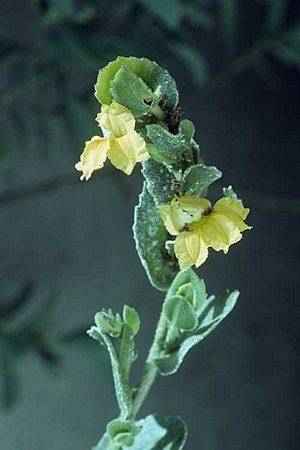Clasping goodenia facts for kids
Quick facts for kids Clasping goodenia |
|
|---|---|
 |
|
| Goodenia amplexans in the ANBG | |
| Scientific classification |
|
| Kingdom: | Plantae |
| Clade: | Tracheophytes |
| Clade: | Angiosperms |
| Clade: | Eudicots |
| Clade: | Asterids |
| Order: | Asterales |
| Family: | Goodeniaceae |
| Genus: | Goodenia |
| Species: |
G. amplexans
|
| Binomial name | |
| Goodenia amplexans |
|
| Script error: The function "autoWithCaption" does not exist. | |
| Synonyms | |
|
|
Script error: No such module "Check for conflicting parameters".
The Goodenia amplexans, often called clasping goodenia, is a beautiful flowering plant. It belongs to the Goodeniaceae plant family. This plant is special because it is endemic, meaning it grows naturally only in South Australia.
It is a small shrub with leaves that feel a bit sticky. Its leaves are shaped like eggs or are long and oval. They also seem to "clasp" or hug the stem, which is how the plant got its common name! The plant produces lovely yellow flowers.
Contents
What Does the Clasping Goodenia Look Like?
The Clasping goodenia is a shrubby plant that smells nice. It usually grows up to about 100 centimeters (about 3.3 feet) tall. Its leaves are covered in fine hairs and feel sticky.
Leaves and Stems
The leaves grow in pairs directly opposite each other on the stem. They do not have their own stalks. Instead, they sit right on the stem and wrap around it a little. This is why they are called "stem-clasping."
The leaves can be egg-shaped, oblong, or oval. They are usually between 30 and 90 millimeters long (about 1 to 3.5 inches). They are also 5 to 30 millimeters wide (about 0.2 to 1.2 inches). You might notice small teeth along the edges of the leaves.
Flowers and Fruit
The bright yellow flowers grow in long, spike-like clusters called racemes. These clusters can be up to 150 millimeters (about 6 inches) long. Each flower sits on a tiny stalk called a pedicel, which is 2 to 3 millimeters long.
At the base of each flower, there are small, leaf-like parts called bracteoles. These are about 1 to 2 millimeters long. The green parts that protect the flower bud, called sepals, are lance-shaped and about 2.5 to 3.5 millimeters long.
The main part of the flower, called the corolla, is yellow and smooth. It measures about 12 to 15 millimeters long. The lower parts of the corolla are 3.5 to 7.5 millimeters long and have small "wings" that are 1 to 2.5 millimeters wide.
Clasping goodenia usually blooms from August to February. After the flowers, the plant produces a small, oval-shaped fruit. This fruit is a capsule that is about 6 millimeters long.
How Did the Clasping Goodenia Get Its Name?
The Clasping goodenia was first officially described in 1857. A famous botanist named Ferdinand von Mueller gave it its scientific name. He wrote about it in a scientific paper called Transactions of the Philosophical Institute of Victoria.
He found these plants growing on hills and valleys near Adelaide. The second part of its scientific name, amplexans, means "embracing" or "hugging." This refers to how the plant's leaves seem to hug its stem.
Where Does the Clasping Goodenia Grow?
The Clasping goodenia is found only in South Australia. It likes to grow in forests and woodlands. You can also find it on sea cliffs.
It grows in specific areas of South Australia. These include the southern Flinders Ranges, the Mount Lofty Ranges, and Kangaroo Island.
 | Lonnie Johnson |
 | Granville Woods |
 | Lewis Howard Latimer |
 | James West |

